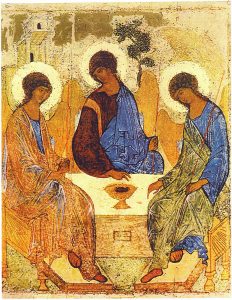EASTER WEEK 03 02
Believe, Pray, Love
(Acts 7:51-8:1; Ps 31; Jn 6:30-35)
**************************************
“Whoever comes to me will never be hungry, and whoever believes in me will never be thirsty.”
Today’s liturgy invites us to deepen our faith in our Trinitarian God, soak up God’s love through prayer, and then keep the law by sharing that love with the world.
Both readings today speak to us of God as a Trinitarian relationship. We need to hear this often as a lot of people tend to operate out of a theist framework, especially in a recovery program – God as a Higher Power or Creator only, or a force out there somewhere and somewhat distant from humanity: Cosmic Forces in the Universe, Queen of Everything, Gods of Laughter are some that I have read. I fear these concepts of God hinder many from the far deeper and richer experience a more relational image of God would offer them.
Jesus in the gospel reminds us of his intimate relationship with the Father, the one who provided manna from heaven to nourish God’s people in the wilderness. We know Jesus spent whole nights sometimes just communing with the Father and lovingly relating to the Father in that contemplative prayer.
Stephen, in the first reading, accuses his fellow Jews of opposing the Holy Spirit, then gazes into the heaven and sees the glory of God and Jesus standing there at the right hand of God. The council and his accusers, so locked into their static image of one monotheistic God as a spiritual power, become enraged, stop up their ears and resort to stoning him to death, so closed were they to this great, new, good news.
Many authors today are writing about God as intimate relationship, an eternal flowing forth of love between three persons, even a perichoresis, or divine dance. André Rublev painted a marvelous work of art inspired by the visit of God as three angelic figures to Abraham and Sarah. Here is how Richard Rohr describes what he sees in that painting:
 “The icon shows the Holy One in the form of Three, eating and drinking, in infinite hospitality and utter enjoyment between themselves. If we take the depiction of God in The Trinity seriously, we have to say, ‘In the beginning was the Relationship.’ The gaze between the Three shows the deep respect between them as they all share from a common bowl.” The Spirit’s hand points toward the open and fourth place at the table, inviting us into that divine interchange of empowering love.
“The icon shows the Holy One in the form of Three, eating and drinking, in infinite hospitality and utter enjoyment between themselves. If we take the depiction of God in The Trinity seriously, we have to say, ‘In the beginning was the Relationship.’ The gaze between the Three shows the deep respect between them as they all share from a common bowl.” The Spirit’s hand points toward the open and fourth place at the table, inviting us into that divine interchange of empowering love.
I truly believe one of the best ways we can enter into that relational dance or perichoresis is through contemplative prayer – just being in God’s presence as Father, Son and Holy Spirit, and soaking up their love in the silence of our hearts. When Jesus assures us that he is the Bread of Life and those who come to him will never hunger or thirst, I think he is speaking of our deepest human needs to be loved, to belong, to be valued, to be honored and given ultimate dignity. That is what will be given to us as we waste time in contemplative prayer. The less we do, think or say, the more the Holy Spirit within us can accomplish in an invisible, unfelt yet very definite way.
Believing in God as Father, Son and Holy Spirit, and immersed in their dynamic love relationship through contemplative prayer, we are now empowered to share that same love with others. Stephen in that first reading accuses the council and his fellow Jews of having received the law, but never keeping it, and in fact, stoning and killing the prophets who tried to point them to Jesus, the true Messiah and anointed one.
That law was the law of love that Jesus gave us as a new commandment: love God with our whole being; love others as we love ourselves; love one another as he has loved us, and especially, love our enemies by forgiving them from the heart. The newness of this commandment to love lies in two critical elements: raising love of others to the same level as the grand Shema of Judaism – loving God with our whole being, and loving our enemies.

Jean Vanier, with Dené translator in Fort Smith
Someone who truly believed in God as Trinitarian loving relationship, who experienced that love of God in contemplative prayer, and who certainly shared that unconditional love of God with the poorest and weakest is Jean Vanier, who passed away on May 6that the age of 90. He gave up a promising career as a university professor of philosophy to invite two mentally challenged men to live with him in his home at Troisly, France, to give them a home and unconditional love, rather than an institution and dutiful service. That gesture attracted others and the international L’Arche movement was born, providing homes for the mentally challenged around the world. His example and writings will continue to inspire others far into the future.
The Eucharist is a sharing in God’s Trinitarian unconditional love, as through the power of the Holy Spirit, humble gifts of bread and wine are transformed into the body and blood of Jesus.
May our celebration strengthen our faith in God as Father, Son and Holy Spirit, as a divine dance. May it inspire us to deepen our experience of that love through contemplative prayer, and may it also empower us to share that love with all others, as did Jean Vanier.




Jesus will always remain as the Father, son and Holy Spirit which is the Trnitarian God . He represents his father by completing his mission and by being his son when he was born from the Virgin Mary and after his resurrection. We can eventually receive his experience the unconditional love by reciting the contemplative prayer and Share the love with other people. When we choose to believe in him and trust him by following his word or teachings we will be saved and we will receive gifts from the Holy Spirit. We can deepen our relationship with God by knowing he is 3 in 1 God ; which is the Holy Trinity or the Trinitarian God. He sent his son Jesus to complete his task on earth and he is the New Covenant . Abraham and Sarah was the first covenant which was Chosen by God. They Swore an oath to keep the word of God present. We are to do the same just like Jean Vanier to share the love out to people, communities by living out the New Commandment. Amen . Praise to You Lord Jesus Christ.
Thanks for the lovely homilies and stories about keeping the word of God present and alive. We are to strengthen our faith to by putting him the Centre of our lives by praise and worshipping him to the fullest. It is very clear what we need to do. Bishop Sylvain Lavoie.